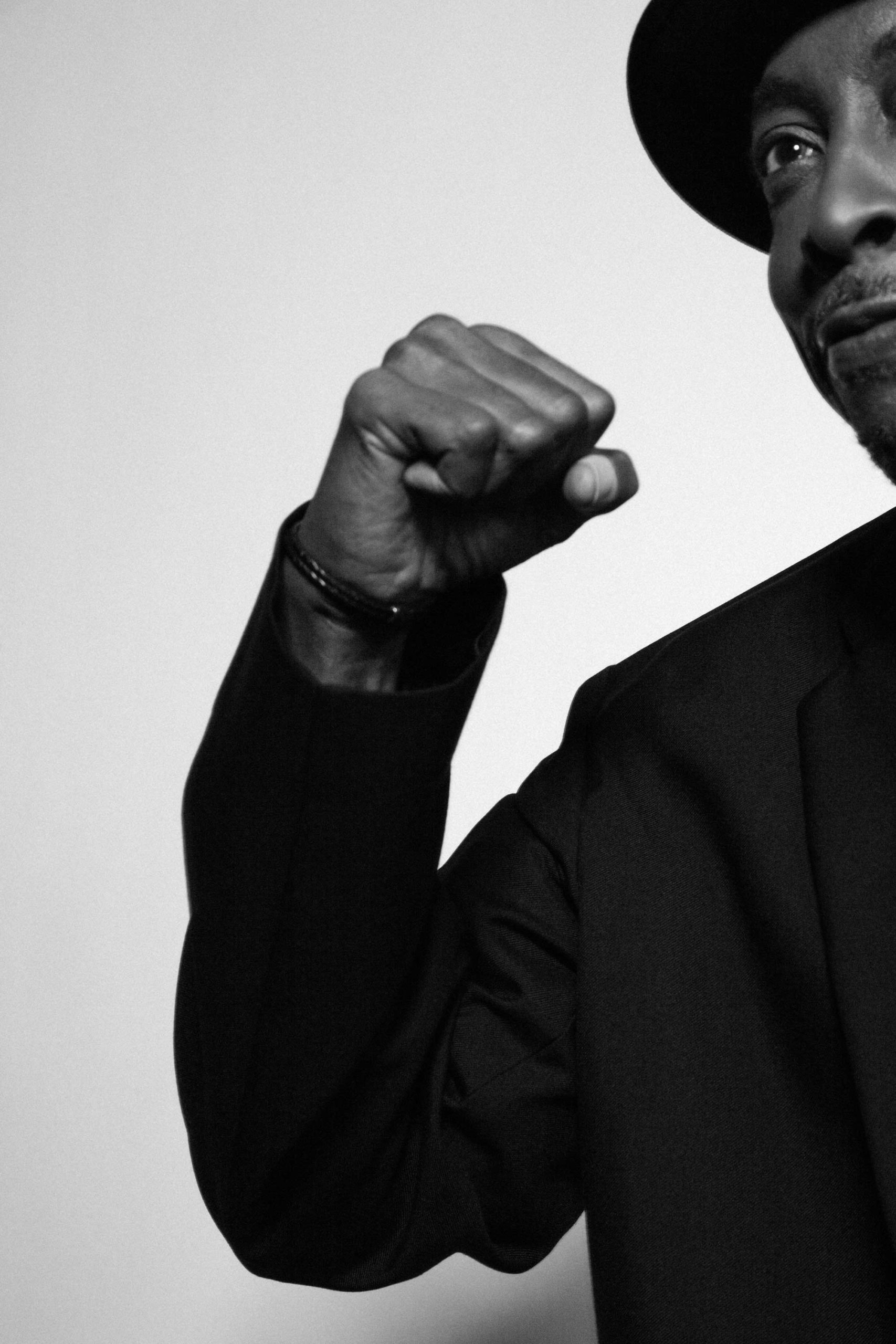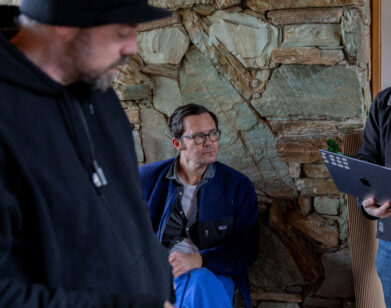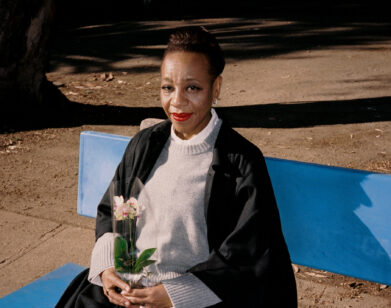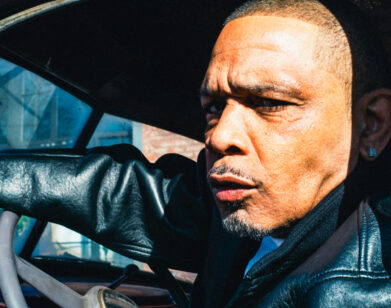Act Two
Arsenio Hall and Magic Johnson Look Back on Their L.A. Glory Days
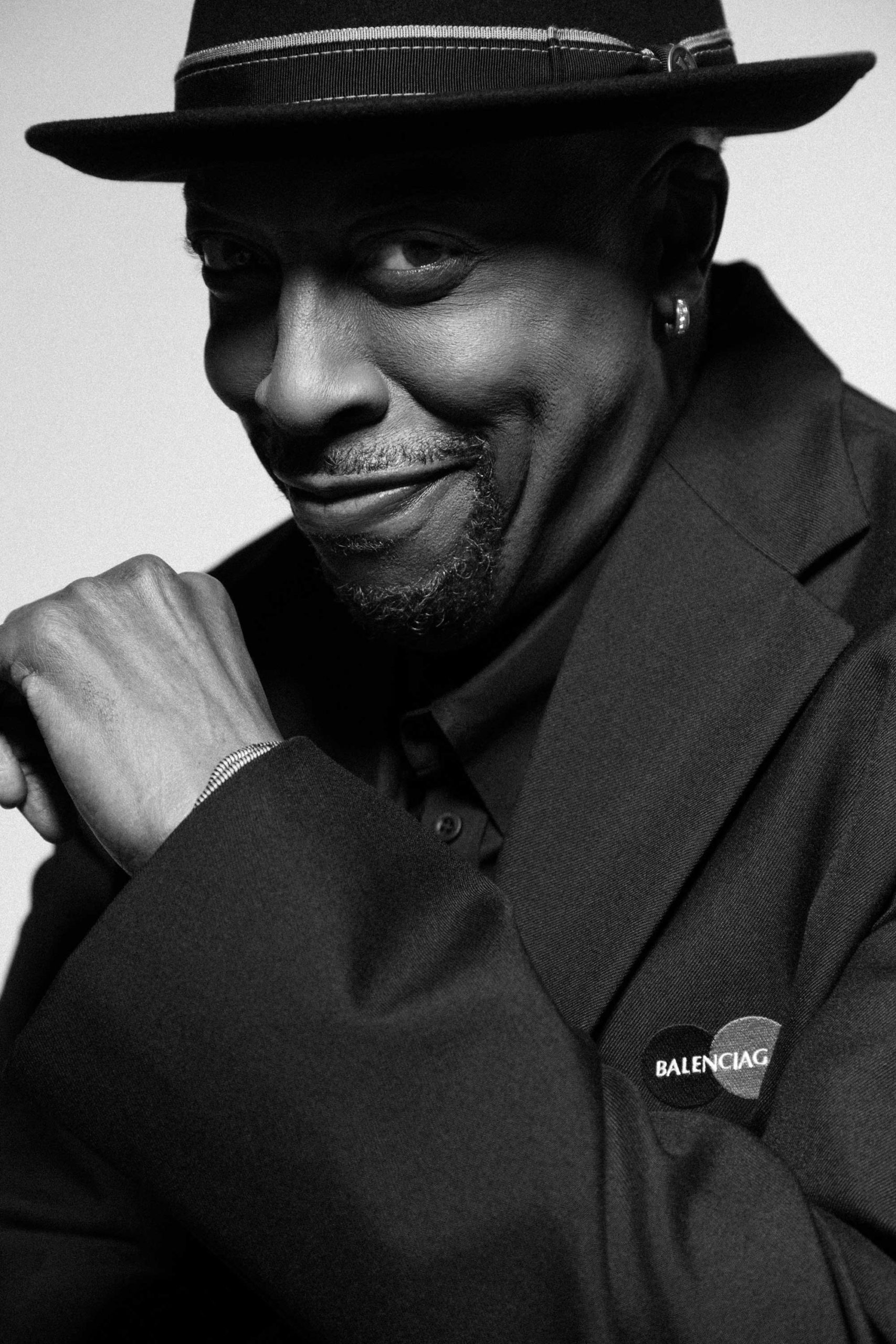
Jacket, Shirt, and Pants (worn throughout) by Balenciaga. Hat, Earring, and Bracelets (worn throughout) Arsenio’s Own.
The day after Earvin “Magic” Johnson revealed to the world that he was HIV positive, the Los Angeles Lakers superstar went to see his friend so they could talk about it. That friend’s name was Arsenio Hall, and their conversation—a frank discussion about the virus and its misconceptions—happened to be broadcast to millions of viewers. “You said, ‘C’mon, man. We’ve got to get the message out,’” Johnson reminded Hall when they reconnected for this interview. “You helped me to move on.”
That was in 1991, and The Arsenio Hall Show was the hottest thing on late night. A talk show with the energy of a nightclub, it showcased a melting pot of talent with an emphasis on Black entertainers, and boasted the rowdiest studio audience on television. At the center of it all was Hall, a stand-up comedian from Cleveland, and the first Black late-night host, whose spontaneous approach, unpredictable interviews, and quicksilver wit made him a natural in front of the camera. Hall had previously shown his comedic chops when he appeared alongside Eddie Murphy in the 1988 comedy Coming to America. As Semmi, the sidekick to the fictional African monarch Prince Akeem, Hall held his own opposite Murphy’s anarchic charisma, and showed range by playing not one, or two, but four of the film’s characters. This spring, Amazon will release the movie’s long-awaited sequel, Coming 2 America, which reunites Akeem and Semmi as they return to the United States in search of the prince’s long-lost son. Speaking of reunions, without further ado we give you Arsenio Hall and Magic Johnson.
———
MAGIC JOHNSON: Well, this is a role reversal for us. This time I get to do the interview. Coming to America changed our culture. It was something that we hadn’t seen before, and it really, I think, changed the movie industry for minorities. Talk about the difference between the original and the sequel.
ARSENIO HALL: The difference is that there’s a bar now. Prior to the first one, there was no bar. I’ve had people say to me and Eddie, “Y’all should have just left it where it was.” Now there’s an expectation that didn’t exist before. So we set the bar, and now we’ve got to reach that bar. The most important thing is making the audience laugh, and it definitely will, but the thing I’m most proud of is that while you’re laughing, there’s a wonderful message that comes through. That men in power, and our bullshit, has to change. That how we treat women has to change. This movie sneaks that message in on you.
JOHNSON: Let’s talk about Semmi. What’s changed for him since Coming to America?
HALL: Semmi is that next-door neighbor you probably wish would move. He’s always messing something up. When I first played him, the great John Landis [who directed Coming to America] said, “I need you to sit down and write down who Semmi is.” I had never done that before, so I came up with an entire dossier on Semmi. I pulled that out when we did this second movie and tried to stick to it. I think Semmi and Akeem are very much like you and me. While Akeem is doing wonderful, meaningful things for the country, Semmi’s out having fun.
JOHNSON: People in Hollywood know, but the general public might not, that you and Eddie are best friends. How was it being on set with him again and watching him do his thing?
HALL: I have an old saying: “If you find something you love to do, you’ll never have to work.” For this project, they shouldn’t have even sent me a check, because I had too much fun. It was like three months at Disneyland. You’re talking about me sitting there with Wesley Snipes, Tracy Morgan, Jermaine Fowler, and Leslie Jones. I felt so sorry for the director Craig Brewer. I was like, “Let the man call action, y’all! Please!” But the biggest change is that when Eddie and I did the first one, we were two actors who got to participate in creating the story and creating our characters. This time around, Eddie has become such an incredible producer. A lot of people take a producer title in this town to make money and to have clout. But there are also people who take producer titles because they have really learned the art form. He really understands the medium now. He’s intellectualized it.
JOHNSON: You and Eddie shot this at Tyler Perry’s massive new studio in Atlanta. I’m really proud of three powerful, successful, intelligent, wealthy Black men getting together. Tell me about that experience.
HALL: You look at the politics of Hollywood, and sometimes it’s easy to complain about what doesn’t exist and how far we have yet to go. But every now and then, you have to look up at god and thank him for what we have and how far we have come. As I drove onto that lot, I was looking at this spectacular entryway with the foliage and gates, and it was just incredible that this place exists. I’d never seen a studio so well-equipped and so beautiful. But the thing that blows you away is that as you’re walking to do your little jokes, you look up, and on top of the building you see names like Cicely Tyson and Sidney Poitier and Oprah Winfrey and Halle Berry. From Genesis to Revelations, it’s all the great actors who have laid the groundwork for us, and you feel a responsibility to step inside these buildings and do what you’ve got to do. It motivated me every day.
JOHNSON: Something that I think about often is that all three of us—me, you, and Eddie—became pioneers in our own right. We were all hot at the same time, and we continued to stay hot. But what I’m really impressed with is the amount of Black actors Eddie was able to give opportunities to. And then you did the same exact thing on The Arsenio Hall Show. You showcased so many people who couldn’t get on regular late-night shows. Talk to me about being a pioneer and showing America that a Black man could bring in not only Black and Latino audiences, but also white audiences.
HALL: You were there in the beginning, and you knew what my mission was. I wanted to create a platform for people who deserved to have a place to perform, but didn’t have one. As a matter of fact, you once told me, “You could have done a show in your green room tonight because there were as many stars in your green room as there were on your couch.”
JOHNSON: You had a late-night show and a club all rolled in one. If I wasn’t working I would come at least three or four times a week, and definitely on Friday, because that’s when everybody and their mama was showing up. It was just something that you had to see. All the A-listers of every race were back there hanging out, having a great time, and making deals.
HALL: It kind of became this clubhouse where Will Smith could sit with Quincy Jones and they could say, “Let’s take that idea to NBC.” And all of a sudden, The Fresh Prince of Bel-Air was created. I wanted to be the guy to create this place where new talent could be seen, because I came up watching Showtime at the Apollo and American Bandstand, but I also came up at a time when MTV wasn’t allowing Black acts on their airwaves. So sometimes you could have a good idea but bad timing. I was blessed with having the right idea at the right time, because now, if I tried to do the same show, it could not be successful because of the internet.
JOHNSON: How so?
HALL: I’ll give you an example. There was a time when if you wanted to drop your single, whether you were Mariah Carey or Busta Rhymes, you called me, I gave you a date, you came on my show, and you dropped the single. We created that hit. Now, I wake up one day and Beyoncé dropped a record while I was sleeping. She doesn’t need me, she doesn’t need Jimmy Fallon. But I am proud to say I got to use my blessing to pull other people through the door, whether it was an intern like John Singleton or Tommy Mottola coming to me and saying, “Hey, I want you to meet Mariah. Listen to this tape, I think you’ll love her.” I think it’s so important to help others get theirs once you get yours.
JOHNSON: What are you going to do now? Are you going back to stand-up?
HALL: I’m not shy about articulating my desires and dreams. I believe you’ve got to put it out into the universe. I’ve been loving stand-up, but getting on that soundstage in Atlanta, I really missed acting, Earvin. And I’m very excited, because I think this is going to give me an opportunity to do more acting, maybe a sitcom. And every hiatus I get, I’ll go out there and do stand-up, because that keeps you close to the people. But I want to act again, so if you’re ready to do The Odd Couple, let’s do it.
JOHNSON: We were always the odd couple. You, Eddie, myself, Keenen [Ivory Wayans], Prince, Janet [Jackson], I can go on. When we hit the door at the clubs, people were like, “Man, oh man, oh man.”
HALL: And what people don’t realize is when you were in the club, you were making deals. We’d be in the club, and all of a sudden, you struck a deal to produce Janet’s tour.
JOHNSON: That’s right! We were at the club that night.
HALL: I’d come back and I’d say, “I got a number.” And you’d say, “I got a contract.”
JOHNSON: [Laughs] “You go ahead and date, I’m going to go get this money.” It’s important that I highlight that the movie was supposed to be released in theaters, and now it’s going to be on Amazon Prime. What were your thoughts on that when it happened?
HALL: When it happened, I called Eddie and we talked about it. His philosophy was that it’s not perfect, but it’s the best alternative. Amazon will make this an event, and we’ll still be at home struggling with COVID-19, so people will be around the crib. We’re excited at the sheer number of people who will get to see this. As far as the business changing, I’m set in my ways. I like the old school. How come don’t nobody sing like Al Green no more? I hate this mumble rap. I could understand what Jeffrey Osborne used to say, but I can’t understand Lil Yachty. But times are changing. People want theaters in their home, and they want home in their theaters. Before this whole thing happened, our kids were going to movie theaters where they could order a pizza that would get delivered to their seat. Sometimes I’ll see my son watching movies on an iPad and it makes me nuts. Our wardrobe person, Ruth [E. Carter], made the costumes for Black Panther. Don’t look at that on an iPhone. Look at that on a big screen, because she worked so hard to make it beautiful.
JOHNSON: You’re one of the best celebrities on Twitter. You do a great job of staying connected with your fans. How do you decide what to tweet?
HALL: Some people get caught up in arguing and conflict, and I really try to avoid that. I refuse to get into a keyboard skirmish with anybody. I try to be positive. When I was hosting my talk show, the first group I had on was Whodini. They came and did “Freaks Come Out at Night.” The other day, one of the gentlemen in Whodini [John “Ecstasy” Fletcher] passed away. I used Twitter to uplift him and say nice things to his family. I think that’s what Twitter should be for. But every now and then, I try to throw some humor in there, because you know how comedy is. Somebody’s gotta get burnt.
JOHNSON: As far as I’m concerned, it’s no different than you hosting your late-night show. You empowered people then, you gave them a platform, you gave them shout-outs, you informed our community. Something we need to talk about is that you were involved in all 11 of the championship rings that I have. You’ve been there for each one. Talk to me about being a Lakers fan for all these years, and then watching them win a championship this year.
HALL: First of all, nothing warms my heart more than the fact that they did it at a time when we were still struggling with Kobe Bryant’s demise. The fact that everybody had Kobe in their heart meant so much to me, because I go way back with this team. I don’t know if I ever said this to you, but I honestly believe that I have a son because of you and this team. When I brought your son E.J. to the Great Western Forum to see you coach, I didn’t have any kids, and in my mind, I was like, “I’m not having no kids. I’m not the father type.” You went into the locker room, and me and E.J. stood in the tunnel. But when you came back out of the locker room, E.J. wasn’t going to let you get past him without acknowledging him. He didn’t care about coaching, the Forum, or the Lakers. There was a connection between a dad and his baby son that I had never been that close to. He started wiggling around in my arms saying “Daddy,” and trying to fall out of my arms like a water balloon. And you came over and grabbed him and kissed him and said something to him, and then you went back out to the floor. But the love that he showed for you that day—and I’ll cry if I talk about it any longer—it made me realize where I had to go at that moment in my life. And it took a while, but I knew I was no longer the guy who was not going to have kids.
JOHNSON: Well, you’ve been a truly outstanding father, and a father figure to a lot of other people, like my kids and Eddie’s kids, and on and on, because that’s just who you are.
HALL: And by the way, I should also thank Cookie [Johnson, E.J.’s mother] for letting me babysit. I don’t think she understood how much I fell in love with fatherhood that day.
JOHNSON: This, to me, has been one of the best interviews ever. But if you want to say one more thing, I’ll leave it up to you.
HALL: Can we talk about what’s wrong with the Clippers?
———
Grooming: Kelly Greer
Production: Amanda Prunesti and Tiffany Yip at Meritocracy Projects.
Digital Technician: Bailey Dale.
Photography Assistant: Danya Morrison
Fashion Assistant: Kristen Kieh

